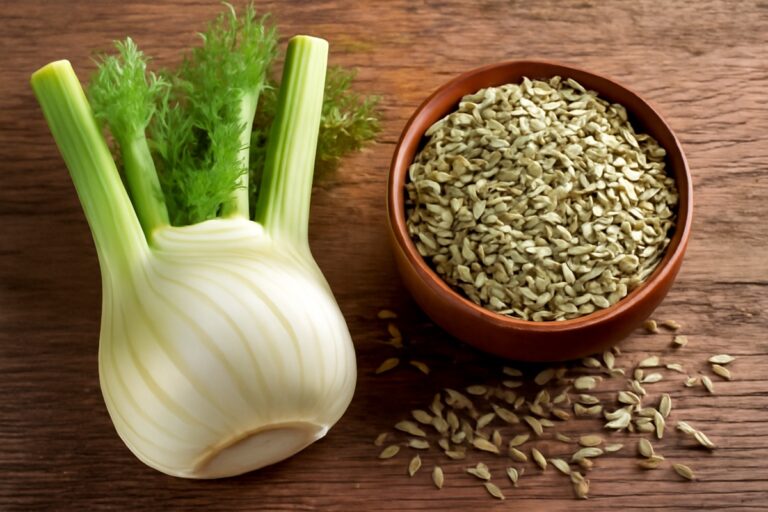Fennel, a versatile plant native to the Mediterranean, offers more than just its distinct licorice-like flavor. Its bulb, leaves, and seeds are widely used in various cuisines around the world, adding both taste and health benefits. From savory dishes to aromatic beverages, fennel’s popularity continues to grow across cultures. In this article, we’ll explore the many uses of fennel and fennel seeds, their nutritional benefits, and the potential health advantages they offer.
The Nutritional Power of Fennel
Fennel is not just a flavorful vegetable; it also packs a nutritional punch. A raw fennel bulb (about 100 grams) provides the following nutrients:
- Calories: 72.8
- Carbohydrates: 17.2 grams
- Protein: 2.91 grams
- Fat: 0.47 grams
- Fiber: 7.28 grams
The fennel plant also contains essential minerals like potassium, sodium, phosphorus, and calcium, making it a valuable addition to your diet. Its rich fiber content and modest caloric value can help maintain a healthy body weight while supporting overall well-being.
Fennel’s Health Benefits
Fennel isn’t just tasty; it also offers numerous health benefits that make it an excellent addition to your diet.
1. Supporting Heart Health
Fennel’s fiber-rich composition plays a key role in maintaining cardiovascular health. Fiber is essential for lowering cholesterol and regulating blood sugar levels, both of which contribute to a reduced risk of developing heart disease. In addition, fennel’s anti-inflammatory and antioxidant properties may help protect against cardiovascular issues such as heart attacks and strokes, which are often linked to chronic inflammation.
2. Aiding Digestion
Fennel has been long known for its digestive benefits. Fennel seeds, in particular, have been used in many cultures to alleviate digestive discomfort, such as bloating and indigestion. Recent studies have even shown that fennel seed extract may help protect against gastrointestinal inflammation, though more research in humans is needed to understand its effects fully.
Additionally, fennel’s fiber content can support digestive health by promoting regular bowel movements and feeding beneficial gut bacteria.
3. Relieving Anxiety
Fennel has also been associated with anxiety relief. A review of studies published in 2022 found that fennel extracts showed promise in reducing anxiety symptoms. Though the studies were primarily conducted on animals or had small sample sizes, fennel’s calming effects could potentially offer relief for those experiencing mild Anxiety.
4. Potential Benefits for Inflammatory Bowel Disease (IBD)
Fennel’s anti-inflammatory properties may offer potential benefits for individuals suffering from inflammatory bowel disease (IBD), including conditions like Crohn’s disease and ulcerative colitis. Fennel’s ability to reduce inflammation could help alleviate symptoms and promote gut health. However, further research in human studies is necessary to determine the full extent of fennel’s protective effects.
Culinary Uses of Fennel
Fennel is a versatile ingredient, and nearly every part of the plant can be used in the kitchen.
- Fennel Bulb: The bulb, located at the base of the fennel plant, has a mild, slightly sweet flavor with a crunchy texture. It can be eaten raw in salads or cooked in dishes like pasta, soups, and stews. Roasting or braising the bulb can enhance its natural sweetness.
- Fennel Leaves: The feathery green leaves are often used as a garnish, adding a light, fresh flavor to dishes. They can also be used in salads or as an aromatic addition to soups.
- Fennel Seeds: Fennel seeds are commonly used as a spice in both savory and sweet dishes. They can be added to baked goods, meats, or even beverages for an anise-like flavor. Fennel seeds are also popular as a natural breath freshener. Simply chewing on a few seeds can help freshen your breath after a meal.
Safety Concerns with Fennel
While fennel is generally safe for most people, there are some precautions to consider. Fennel contains a compound called estragole, which is found in its essential oils. Estragole has been linked to potential carcinogenic effects in animal studies, and it may also affect fetal development during pregnancy. However, the amount of estragole in fennel is minimal, and more research in humans is needed to assess its impact fully. Pregnant women or individuals concerned about estragole may want to consult with a healthcare provider before using fennel extensively.
How to Incorporate Fennel into Your Diet
Fennel is easy to incorporate into your daily meals. To prepare fennel, wash it thoroughly and chop it into slices or small pieces. The bulb can be eaten raw in salads or cooked in a variety of dishes. Fennel seeds are an excellent addition to baked goods, roasted meats, or even teas. For a refreshing snack, try chewing fennel seeds after meals to help with Digestion.
Conclusion
Fennel and its seeds offer a wealth of culinary and health benefits. Whether you’re adding fennel to your salads, soups, or baked goods, its unique flavor and nutritional profile make it a valuable addition to your diet. Rich in fiber, antioxidants, and essential vitamins and minerals, fennel can contribute to heart health, digestive wellness, and overall well-being. As research continues, fennel’s full range of health benefits may become even clearer, making it a top choice for those seeking both taste and nutrition.
By incorporating fennel into your meals, you can enjoy its flavorful crunch and reap its many health benefits, all while embracing the rich tradition of this Mediterranean superfood.








